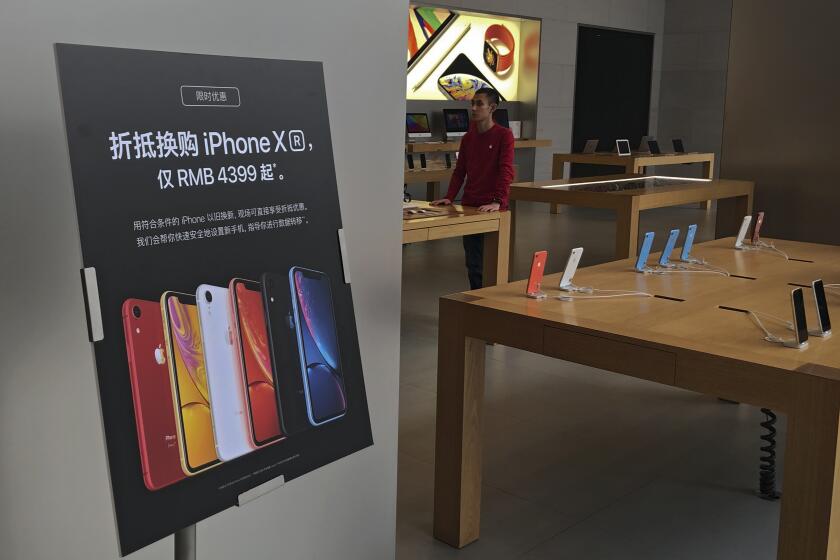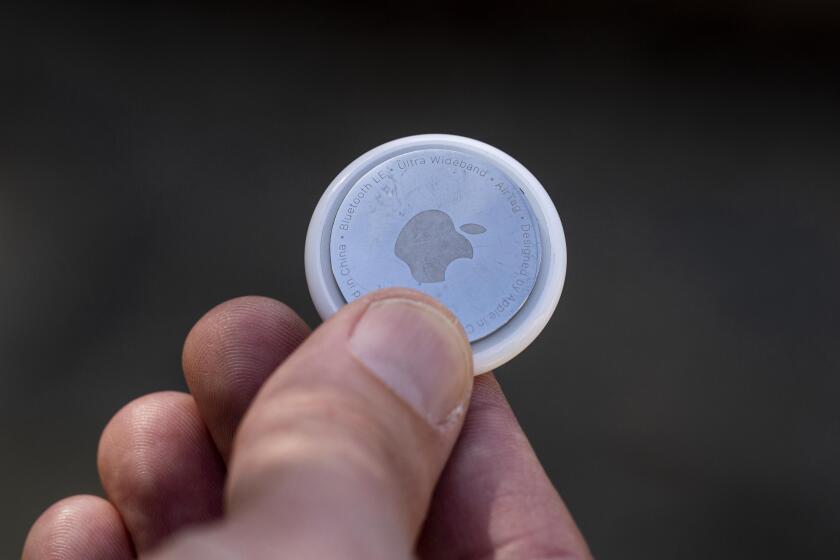U.S., California sue Apple, alleging company monopolized smartphone market

- Share via
The U.S. Justice Department and 16 state attorneys general, including California’s, filed a sweeping antitrust lawsuit against Apple on Thursday, alleging that the technology giant attempted to monopolize the smartphone market to boost its business.
The complaint, filed in U.S. District Court in New Jersey, alleges that Cupertino, Calif.-based Apple violated antitrust laws by engaging in practices that were intended to keep consumers dependent on the iPhone, which for years has been the cornerstone of the company’s multi-trillion-dollar empire.
Apple has done this, the lawsuit alleges, by preventing other companies from offering applications that compete with Apple’s products, such as its digital wallet; by suppressing the use of “super apps” and cloud-based games; as well as by diminishing functionality between iPhones and non-Apple devices. The lawsuit comes after a years-long investigation into the company’s business practices.
California Atty. Gen. Rob Bonta said Thursday that Apple has been taking unlawful steps for at least 15 years to tighten its hold on the smartphone market, shortchanging consumers in the process.
“Apple has created a moat around its kingdom and trapped customers into continuing to use iPhones and buy more iPhones, which are the leading revenue driver in Apple’s business model, and keeping out other types of technologies or services that could provide a better user experience,” Bonta said. “They are not the leader in the market that they are because they are winning on the merits. They are in that place — in that front position — because of illegal monopolistic behavior.”
IPhones are the most popular smartphone in the United States, accounting for more than 60% of sales, analysts say. Its main competition comes from phones made by Samsung and other manufacturers that run Alphabet’s Android operating system.
Consumers may see lower prices on app subscriptions and purchases if the Department of Justice succeeds in its lawsuit against Apple, consumer advocates said.
Apple generated annual net revenue of $383 billion in 2023 and a net income of $97 billion. IPhone sales made up the largest chunk of the company’s revenue in its most recent quarter.
“This lawsuit threatens who we are and the principles that set Apple products apart in fiercely competitive markets,” an Apple spokesperson wrote in a statement. “If successful, it would hinder our ability to create the kind of technology people expect from Apple — where hardware, software, and services intersect. It would also set a dangerous precedent, empowering government to take a heavy hand in designing people’s technology.”
The government alleges that over the years, Apple has blocked banks and other finance companies from developing alternative payment products that would compete with Apple’s digital wallet on the iPhone. At the same time, the company has encouraged those banks to participate in Apple Wallet. Apple has also made it challenging for someone with an iPhone to use non-Apple smartwatches and other connected devices in an effort to boost its own products, U.S. Atty. Gen. Merrick Garland said during a news conference Thursday.
Garland used text messages between iPhone and Android users as another example of the company’s alleged monopolistic practices. He argued that Apple purposely diminishes the functionality of its own messaging app and other apps to degrade quality when interacting with non-Apple devices — leading to conversations that can’t be encrypted, videos with lower picture quality, and the loss of editing functions and message-in-progress indicators — in an effort to make iPhones seem to be a superior product.
“As a result, iPhone users perceive rival smartphones as being lower quality because the experience of messaging friends and family who do not own iPhones is worse — even though Apple is the one responsible for breaking cross-platform messaging,” Garland said.
Apple to pay $490 million to settle allegations that it misled investors about iPhone sales in China
Apple has agreed to pay $490 million to settle a class-action lawsuit alleging CEO Tim Cook misled investors about a steep downturn in iPhone sales in China.
The lawsuit also alleges that Apple has refused to allow cloud-based streaming game apps, which don’t rely on expensive smartphone hardware, and so-called super apps capable of performing a variety of tasks — such as messaging and mobile payment — that typically are handled by separate applications.
John Bergmayer, legal director at nonprofit public interest group Public Knowledge, applauded the lawsuit, calling it a crucial step toward restoring competition and boosting innovation in the mobile ecosystem.
“Consumers are paying the price for Apple’s abuse of its gatekeeper power — not just in higher smartphone prices, but in reduced innovation and a more limited, locked-down user experience,” Bergmayer said in a statement. “As the complaint describes, privacy and security do not justify Apple’s actions. Protecting users does not justify, nor require, anticompetitive and illegal conduct.”
“In fact, as the complaint alleges, Apple’s actions can harm the security and privacy of smartphone users, by putting obstacles in the way of secure, cross-platform messaging,” he said.
Larry Downes, an internet industry analyst, said the case probably will come down to whether the government can prove that consumers are being harmed by Apple’s practices. The plaintiffs could point to the fact that iPhone users can’t get any application they want in the App Store, which is open only to Apple-approved apps. But, he said, Apple could argue that consumers are looking for a highly curated and closed system that isn’t as susceptible to viruses and other problems, which is why they choose to purchase its products.
The case probably will take years to resolve, and some of the issues being fought over could be irrelevant by that time, Downes said.
“It’s just a really bad fit between antitrust and tech, and not because tech companies are 100% innocent and don’t do anything wrong,” he said. “But generally speaking the market fixes the problems — not intentionally, but because new technologies come along, new competitors arise, and users change their preferences. So oftentimes antitrust action is not the way to solve the problem.”
A federal judge in San Francisco dismisses several of the claims against Apple but denies the company’s motion to dismiss the case entirely.
Thursday’s lawsuit is the latest lodged by U.S. officials against large technology companies. The government also has filed antitrust complaints in recent years against Amazon, Google and Meta.
Apple has faced increased scrutiny as its power in the smartphone market has grown.
The Justice Department last sued Apple in 2012, accusing the company of colluding with book publishers to fix e-book prices. Apple was required to pay a $450-million settlement in the case.
Epic Games, the maker of “Fortnite,” sued Apple in 2020, alleging that the company violated federal law because it banned third-party app marketplaces on its operating system, requiring all developers to use Apple’s App Store. The dispute began after Apple booted “Fortnite” from the App Store because Epic had created a workaround to paying the 30% fee that Apple collected from developers on customers’ in-app purchases.
A U.S. District judge ruled in that case that Apple didn’t maintain a monopoly in the market for mobile games, but ordered the company to permit developers to alert customers to different payment options outside the App Store.
Apple was also hit this month with a $2-billion penalty by the European Union after an investigation into allegations that it prevented music streaming competitors, such as Spotify, from communicating with users about deals that could draw customers away from Apple’s App Store.
Whereas European regulators have focused largely on the company’s App Store, the U.S. government’s case is much more sweeping, taking aim at Apple’s entire menu of products and services.
The lawsuit seeks to restore competition in the tech market to protect customers from higher prices and expand their product choices, Garland said.
“Consumers should not have to pay higher prices because companies break the law,” Garland said. “We allege that Apple has employed a strategy that relies on exclusionary, anticompetitive conduct that hurts both consumers and developers. For consumers, that has meant fewer choices; higher prices and fees; lower quality smartphones, apps, and accessories; and less innovation from Apple and its competitors.”
More to Read
Sign up for Essential California
The most important California stories and recommendations in your inbox every morning.
You may occasionally receive promotional content from the Los Angeles Times.














